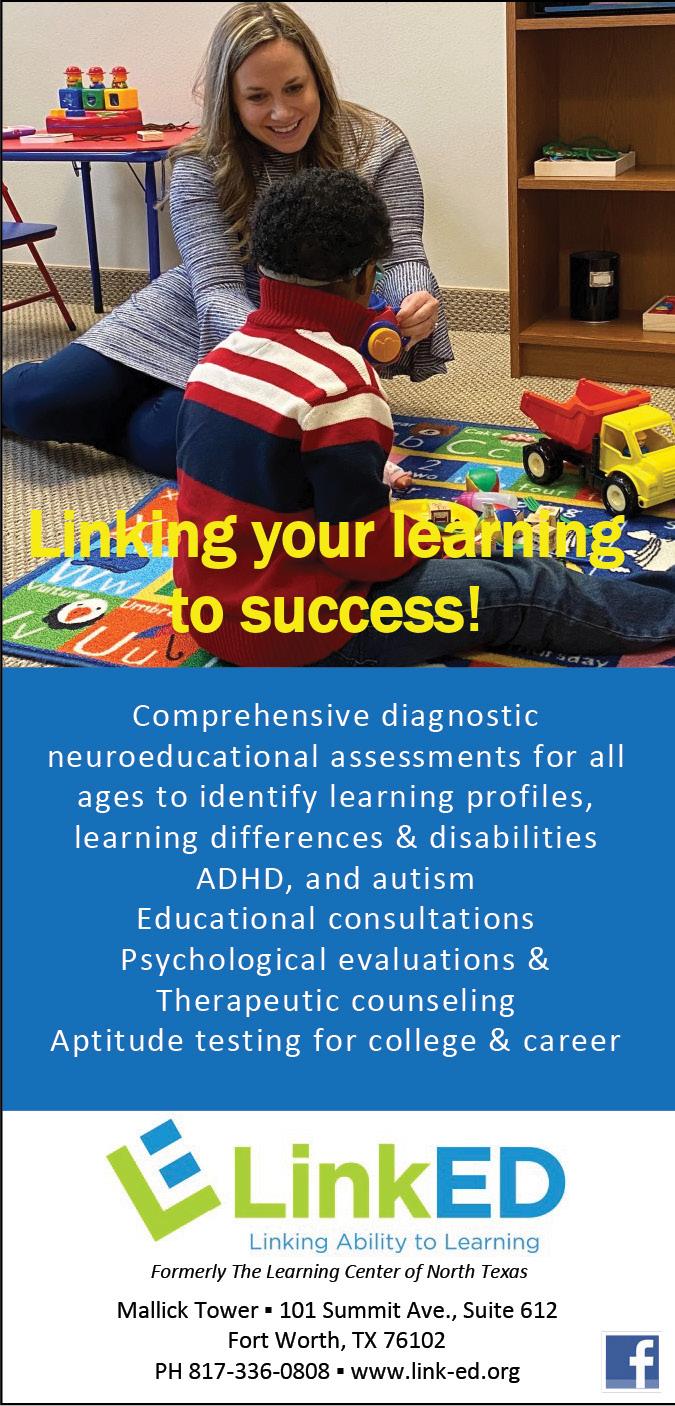
4 minute read
Hearts and Minds
from DFWChild May 2021
by DFWChild
noted.
HEARTS AND MINDS
Advertisement
how therapy can benefit your child
SABRINA BLAKELY NOTICED HER SON’S INTENSE ANXIETY after a misunderstanding in the bathroom. Blakely (who asked to remain anonymous) found her son, then 4, trying to flush essentially a whole roll of toilet paper.
“My reaction wasn’t the greatest,” the Frisco mom admits. “And I made a comment that he was going to flood the bathroom.”
To a young child, the word flood was terrifying. In fact, Blakely’s son quit using that bathroom altogether. “He thought he would die by drowning in there,” she said. “And a small ceiling crack made him think our roof was going to collapse. There was nothing I could say that would calm him down.”
That’s why Blakely, who had seen a counselor for years, decided to take her son to therapy. While his concerns were unreasonable, they were very real to him.


SEE THE SIGNS before someone took notice and recognized Anxiety, depression, anger problems, grief: the need for help.” these diagnoses and conditions apply to A general guideline for seeking professionchildren, even if the situations they face are al help is when there is a significant difference different from grown-up problems. from how a child typically acts. “If you can’t
“Thoughts are often at the crux of the figure it out or you need support in dealing struggle” that brings someone to counsel- with the situation, you want to take them ing, says Kyrstin Jimenez, Ph.D., of Clear Life to counseling,” Jimenez explains. “If they’re Counseling & Testing in Frisco. “Kids might having accidents, crying all the time, isolating face a similar situation with a bully or feeling and shutting down, even if they’re an adolesleft out, but it’s their thoughts that inform how cent—anytime there’s a big shift in demeanor, they feel about it. If kids think, I have other or when what you’ve tried to do isn’t working, friends and activities; I can get through it, that’s look into counseling.” one thing. But when a child thinks, I’m not lovable if those people don’t like me, then you THERAPY PLAY-BY-PLAY have a problem.” For young children, from toddlerhood up to
The situation that might result in mistaken age 10 or 12, play therapy is standard. Play beliefs, as therapists call them, can be in any therapy doesn’t require children to verbalize; realm: friendships, behavior, a parent-child instead, toys and play are used to understand relationship or academic struggles, for ex- what’s happening, unravel a child’s emotions ample. Another child’s problems may involve a and teach coping mechanisms. While parents big change, such as a divorce or the death of a or other lay people may see simple play, loved one (including trained counselors a pet). will see metaphors, Many parents try to help their children “THERE WAS patterns and emotional expressions deal with a troubling circumstance on their NOTHING I that children are communicating. own, but that method doesn’t always succeed. Parents may be too close to the problem their child COULD SAY THAT WOULD Older children, up to age 17, may take part in activity therapy, using items such as puzzles or art supplies is experiencing, or they could be part of CALM HIM to engage with the therapist and work on it. And therapists are specially trained to DOWN.” areas of concern. Sessions are often diagnose and work limited to the child with children. Plus, and the therapist; if some kids just do you ask what hapbetter with an outside individual. “I think it’s pened, “don’t be surprised if the child says, ‘We really good for kiddos to have a trusted adult just played,’ or, ‘Nothing much,’ because chilwho is not their parent to talk about hard stuff dren often do not understand the therapeutic with,” says Blakely, noting that the therapists process,” Taylor says. at Connect to Thrive in Plano have helped her But parents of children in counseling son and daughter (who has depression) with will get information and insight. “The parent everything from social skills and getting along should work with a therapist who includes at home to general emotional well-being. the parent, whether through consultation, in-
Mental health problems in children have session training where the parent works with become more common recently. Isolation from the child through coaching by the therapist, or friends, virtual school, perhaps the illness or family therapy,” Taylor adds. “Depending on even the death of a family member—those the severity of the issues, it may take several things take a toll. Since the beginning of the months or longer to see progress, but progress pandemic, there has been an increase in chil- is often amplified when parents take part in the dren and adolescents diagnosed with anxiety therapy process.” or depression, according to Becky Taylor, That’s how Blakely approaches her chilPh.D., a professor of counseling in the College dren’s treatment. In addition to the kids’ own of Education at Texas Christian University sessions, she meets with their counselors and in Fort Worth. Taylor points to a study that occasionally sits in on sessions when asked. showed a 24% increase in emergency room Blakely’s kids have graduated from therapy visits for mental health crises in children ages and returned multiple times as they grow and 5–11 in the past year, and a 31% increase for encounter new situations, and she maintains those ages 12–17. “The problem is magnified that the benefits for the entire family are when you consider that these [situations], tangible. “When you’re able to work through unlike an accident, did not occur suddenly,” things and come to a good place, there’s a lot Taylor notes, “but were developing for a while more harmony.”



